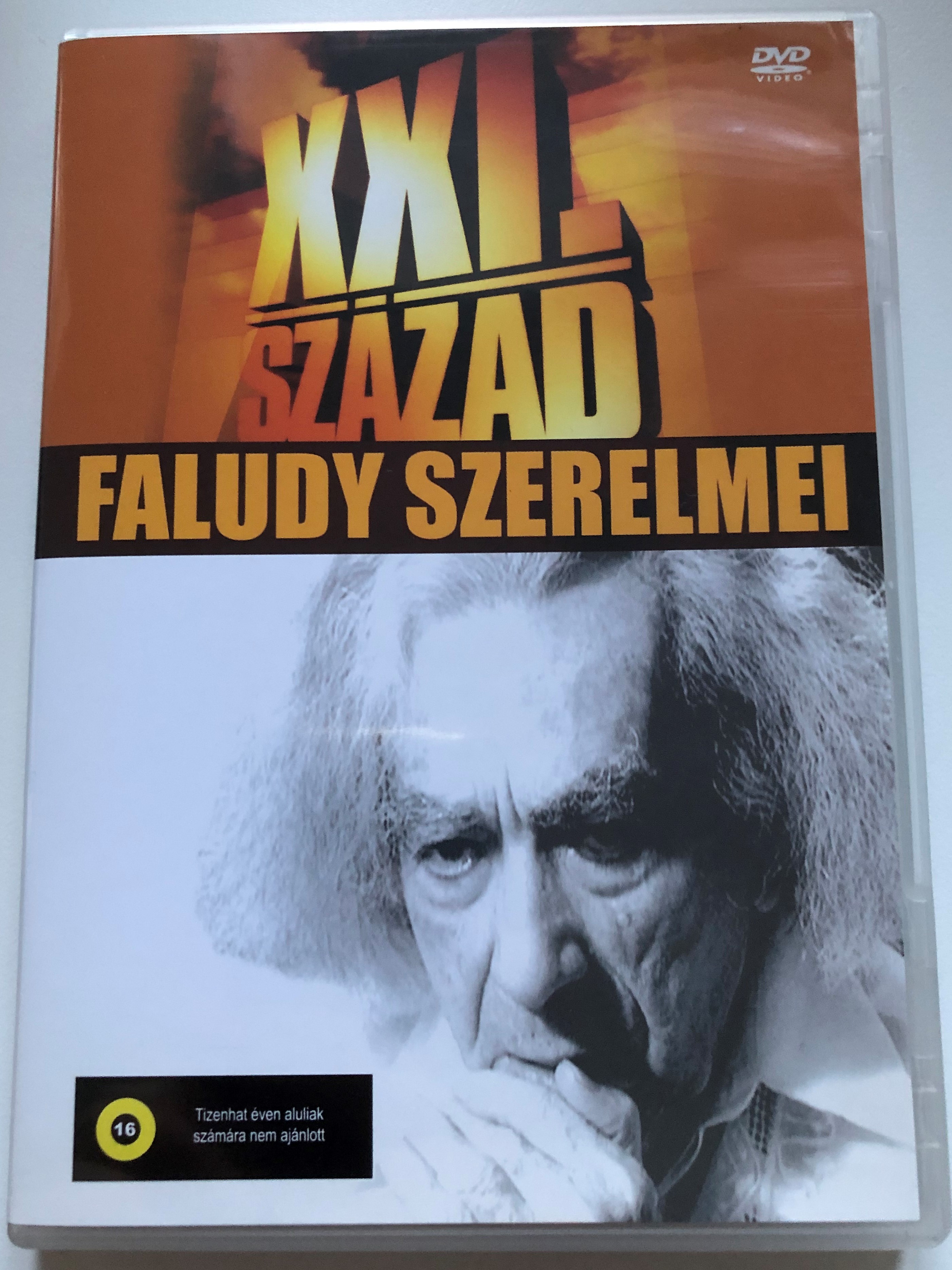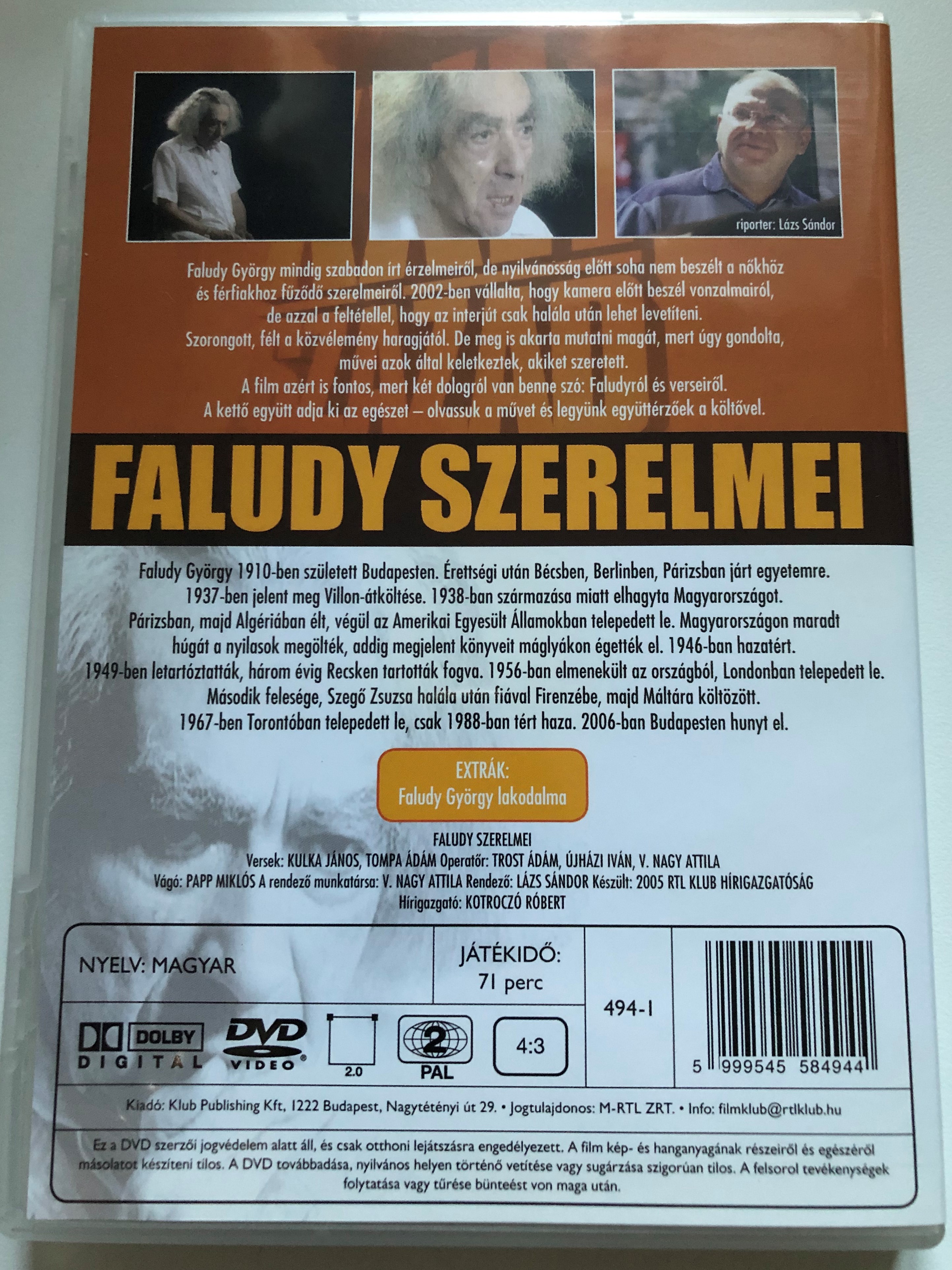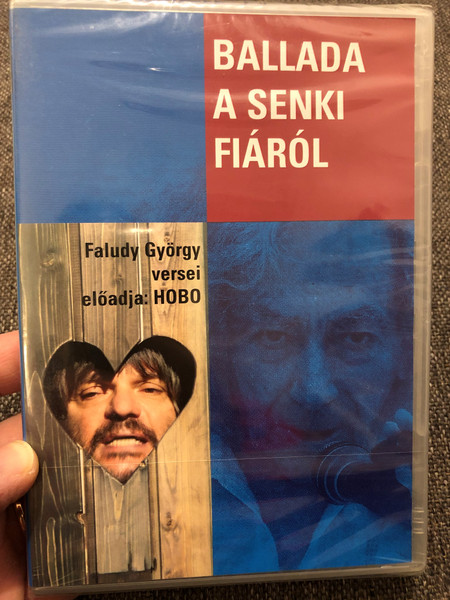Description
XXI. század - Faludy Szerelmei DVD 2005 Faludy's loves - Documentary about György Faludy Hungarian poet writer and translator / Directed by Lázs Sándor / Featuring Kulka János, Tompa Ádám
UPC 5999545584944
REGION 2 PAL DVD
MADE IN Hungary
AUDIO: Hungarian 2.0
SUBTITLES: -
Total Runtime: 71 minutes
EXTRÁK: Faludy György lakodalma
FALUDY SZERELMEI
Vágó: PAPP MIKLÓS
A rendező munkatársa: V. NAGY ATTILA
Rendező: LÁZS SÁNDOR
Készült: 2005 RTL KLUB HÍRIGAZGATÓSÁG
Hírigazgató: KOTROCZÓ RÓBERT
Versek: KULKA JÁNOS, TOMPA ADAM
Operatör: TROST ÁDÁM, ÚJHÁZI IVÁN, V. NAGY ATTILA
Faludy György 1910-ben született Budapesten. Érettségi után Bécsben, Berlinben, Párizsban járt egyetemre. 1937-ben jelent meg Villon-átköltése. 1938-ban származása miatt elhagyta Magyarországot. Párizsban, majd Algériában élt, végül az Amerikai Egyesült Államokban telepedett le. Magyarországon maradt húgát a nyilasok megölték, addig megjelent könyveit máglyákon égették el. 1946-ban hazatért. 1949-ben letartóztatták, három évig Recsken tartották fogva. 1956-ban elmenekült az országból, Londonban telepedett le. Második felesége, Szegő Zsuzsa halála után fiával Firenzébe, majd Máltára költözött. 1967-ben Torontóban telepedett le, csak 1988-ban tért haza. 2006-ban Budapesten hunyt el.
Faludy György mindig szabadon irt érzelmeiről, de nyilvánosság előtt soha nem beszélt a nőkhöz és férfiakhoz fűződő szerelmeiről. 2002-ben vállalta, hogy kamera előtt beszél vonzalmairól, de azzal a feltétellel, hogy az interjút csak halála után lehet levetíteni. Szorongott, félt a közvélemény haragjától. De meg is akarta mutatni magát, mert úgy gondolta,
művei azok által keletkeztek, akiket szeretelt. A film azért is fontos, mert két dologról van benne szó: Faludyról és verseiről. A kettő együtt adja ki az egészet - olvassuk a művet és legyünk együttérzőek a költővel.
English Summary
György Faludy (September 22, 1910 – September 1, 2006), sometimes anglicized as George Faludy, was a Hungarian poet, writer and translator.
Faludy completed his schooling in the Fasori Evangélikus Gimnázium and studied at the Universities of Vienna, Berlin and Graz. During these times he developed radical liberalist views, which he maintained till the very last days of his life.
In 1938, he left Hungary for Paris because of his Jewish ancestry, and then for the U.S. During World War II, he served in the American forces. He arrived back in Hungary in 1946. In April 1947 he was among a group that destroyed a Budapest statue of Ottokár Prohászka, a Hungarian bishop who is respected by many but who is often considered antisemitic. He only admitted his participation forty years later.
In 1949 he was condemned with fictitious accusations and was sent to the labor camp of Recsk for three years. During this time, he lectured other prisoners in literature, history and philosophy. After his release he made his living by translation. In 1956 (after the Revolution) he escaped again to the West. He settled in London, and was the editor of a Hungarian literary journal.
It was during his stay in London that Faludy wrote his memoir, which was soon translated to English, by which he is still best known outside Hungary: My Happy Days in Hell. (It was only published in his native language in 1987, and since then in several further editions.) He moved to Toronto in 1967 and lived there for twenty years. He gave lectures in Canada and the U.S. and was the editor of Hungarian literary journals. In 1976, he received a Canadian citizenship and two years later was elected as an honorary doctor of the University of Toronto where he regularly taught. His poems were published by The New York Resident in 1980 (see below with the other collections).
In 1988 Faludy returned to Hungary. After the fall of communism, his works, which were forbidden, confiscated, destroyed and distributed as samizdat during the Communist period, were at last published in Hungary. New collections of poems appeared in the 1990s, and several translations as well. In 1994 he received the most prestigious award in Hungary, the Kossuth Prize. In 2000 he published the sequel of My Happy Days in Hell: "After My Days in Hell" in Hungarian (no data available about any English translation), about his life after the labour camp. In the years preceding his death, Faludy was considered not only as a poet, a writer and a translator but as a living legend in Hungary.
Hungarian Summary
Faludy György, szül. Leimdörfer György Bernát József, angol nyelvterületen olykor George Faludy (Budapest, Erzsébetváros, 1910. szeptember 22. – Budapest, 2006. szeptember 1.) Kossuth-díjas magyar költő, műfordító, író.
Budapesten született zsidó polgári családban. Édesapja Leimdörfer Jenő (más forrás szerint Leimdörfer Joachim (Chájim)) vegyész, édesanyja Biringer Erzsébet Katalin volt. 1928-ban érettségizett a fasori Evangélikus Főgimnáziumban, ezután a bécsi (1928–30), a berlini (1930–31), a párizsi (1932) és a grazi (1932–33) egyetemen tanult. 1933–34-ben katonai szolgálatot teljesített zászlósi rendfokozatban, amelytől később megfosztották. 1937-ben jelentette meg a Villon-átköltéseket, mely jó időre meghatározta pályáját.
Faludy György mindig szabadon írt érzelmeiről, de nyilvánosság előtt soha nem beszélt a nőkhöz és férfiakhoz fűződő szerelmeiről. 2002-ben vállalta, hogy kamera előtt beszél vonzalmairól, de azzal a feltétellel, hogy az interjút csak halála után lehet levetíteni. Szorongott, félt a közvélemény haragjától. De meg is akarta mutatni magát, mert úgy gondolta, művei azok által keletkeztek, akiket szeretett. A film azért is fontos, mert két dologról van benne szó: Faludyról és verseiről. A kettő együtt adja ki az egészet - olvassuk a művet és legyünk együttérzőek a költővel. Faludy György 1910-ben született Budapesten. Érettségi után Bécsben, Berlinben, Párizsban járt egyetemre. 1937-ben jelent meg Villon-átköltése. 1938-ban származása miatt elhagyta Magyarországot. Párizsban, majd Algériában élt, végül az Amerikai Egyesült Államokban telepedett le. Magyarországon maradt húgát a nyilasok megölték, addigi megjelent könyveit máglyákon égették el. 1946-ban hazatért. 1949-ben letartóztatták, három évig Recsken tartották fogva. 1956-ban elmenekült az országból, Londonban telepedett le. Második felesége, Szegő Zsuzsa halála után fiával Firenzébe, majd Máltára költözött. 1967-ben Torontóban telepedett le, csak 1988-ban tért haza. 2006-ban Budapesten hunyt el.























